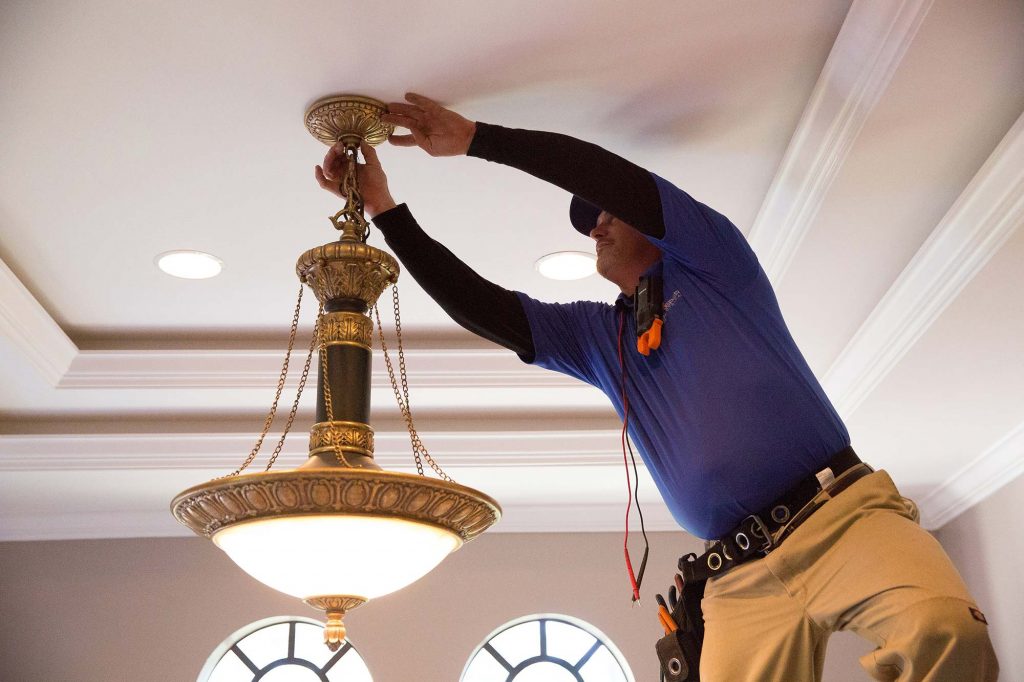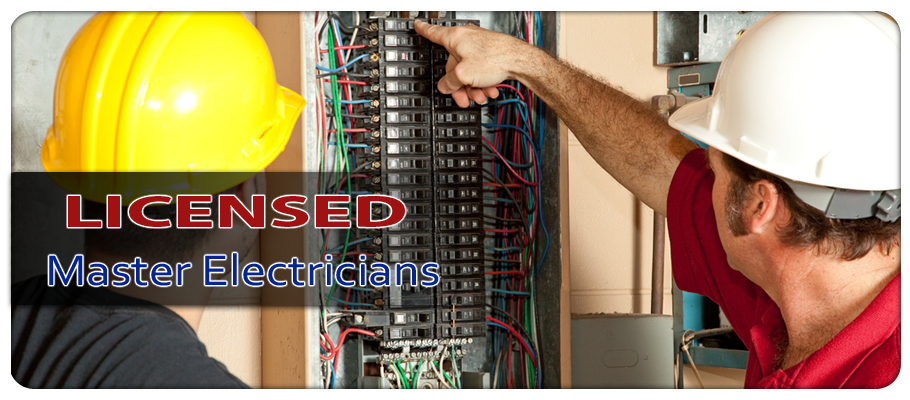Your Professional Residential Electrician

When you have an electrical issue in your home, it can be scary. Faulty electrical work can often lead to fires that can put not only your home but also your family in jeopardy. This is one of the many reasons why it is imperative to hire an electrician that has the experience and knowledge of all different types of electrical work as well as the ability to always work with safety in mind.
This goes for us as well as your family and the future of your home as you continue to use electricity each and every day. Electrical work done by a general handyman may appear to be in working order and safe, but over time you could experience hazardous sparks within the walls that could lead to a disastrous fire or electrocution. The electricians at Mr. Electric are all highly knowledgeable, trained and pride themselves on a high standard of workmanship. We have experience with all aspects of electrical work, from installation, repair and routine maintenance of the entire electrical system that runs throughout your home.
What are some of households common requests for service?
Home Wiring Updates
Installing sufficient wiring goes beyond safety – it also means enhancing your home’s functionality, reliability, and ability to keep up with today’s ever-increasing power needs. The wiring in your home, seldom inspected after installation, may need an update, especially if your home is more than 40 years old. Reduce your risk of electric shocks, tripped breakers, and residential fires with updated home wiring from Double Enterprises© today!
Signs Your Home Wiring Needs an Upgrade
There are many possible signs that it’s time for a home wiring upgrade, including:
1. You Have Old House Wiring
Rewiring a house is a large, complex project. But the good news is that old house wiring doesn’t always have to be completely replaced. However, some wiring definitely must go. Aluminum wiring used in the ‘60s and ‘70s, non-metallic wiring installed in the ‘40s and ‘50s, and knob and tube wiring in pre-1930s homes are well-known safety hazards, as are loose connections and frayed wires due to botched DIY alterations or wear and tear over time.
2. You Have Two-Pronged, Ungrounded Outlets
Two-prong outlets are an enormous safety hazard – for you and your electronics. Without proper grounding, electrical excesses have nowhere to go but into your devices – or you – even if you have a surge protector. Reduce shock risks by getting grounded wires and three-prong outlets installed.
3. You Are Missing GFCIs
Identified by the “TEST” and “RESET” buttons on receptacles, GFCIs protect against shock in high moisture areas. They are currently required in bathrooms, kitchens, laundry rooms, utility rooms, garages, spa/pool areas, unfinished crawlspaces/basements, and any electrified areas outside of your home. If you’re lacking these inexpensive, easy-to-install devices in any of these important areas, you may be in for a shocking experience.
4. You Are Missing AFCIs
AFCIs prevent fire by acting as a circuit breaker, which disconnects in the event of a potentially dangerous arc. They are required in bedrooms in all 50 states, and some states require them in all circuits throughout the home.
5. Your Appliance Outlets Are Inadequate
Household appliances didn’t always have special plugs. But today, a 240-volt outlet is required for each oven, clothes dryer, and other heavy-duty appliance. Older 240 plug wiring features three prongs, but the most up-to-date 240 plugs have four prongs due to the addition of a ground wire for improved safety.
6. Your Home’s Electrical Panel Is Insufficient
How many amps power your home? Just a couple of decades ago, 60-amp circuit breaker wiring may have been sufficient. However, today’s homes often need 100 to 200 amps to successfully operate all the appliances and electronics you use simultaneously, from mobile devices and flat screen televisions to your refrigerator and air conditioner. The best way to meet your home’s growing energy needs is to get upgraded breaker box wiring installed.
GFCI Outlet Installations and Replacements

GFCI outlets, or ground fault circuit interrupters, protect against the risk of electrical shock. GFCI outlet installation provides an inexpensive solution to preventing electrical shock and offers the added bonus of bringing your home up to modern building code standards. Double Enterprises© will help keep your family safe by performing your GFCI outlet installations and replacements.
What Is a GFCI Outlet?
GFCI outlets are required in areas like kitchens, bathrooms and garages, where the risk of electrical shock is greatest. GFCIs can be identified by the “test” and “reset” buttons located on the receptacle. These outlets help protect you from electrical hazards by monitoring the amount of electricity flowing in a circuit. The moment the outlet detects an imbalance in the flow of electricity, the GFCI cuts off power to the outlet.
How to Operate a GFCI Outlet
If your GFCI outlet stops the flow of power under normal operating conditions, press the “reset” button to restore power. GFCIs are much more reliable than depending on the circuit breaker in your electrical panel to stop current flow, as GFCIs are more sensitive to small variations in current. In fact, they are designed to cut off power flow before an electric shock can affect your heartbeat. Because of this critical safety function, it is important to test all of the GFCI outlets in your home monthly.
How to Test GFCI Outlet Performance
- Press the “test” button to stop electrical flow to the outlet.
- Plug in a night light or other small device that uses a minimal amount of electricity to ensure current is no longer flowing to the receptacle.
- Press the “reset” button to return power flow to the outlet.
Where Are GFCI Outlets Required?
GFCIs have been required in homes since 1971, when they were mandated for use with swimming pool equipment and along the exterior walls surrounding pools. Today, there are many other areas of your home where GFCI outlets are required, especially in areas where the risk of electrical shock is increased due to possible exposure to risk factors such as water.
GFCI outlets are required in:
- Spa and pool areas since 1971
- Your home’s exterior since 1973
- Bathrooms since 1975
- Garages since 1978
- Kitchen countertops since 1987
- Crawlspaces and unfinished basements since 1990
- Wet bars since 1993
- Laundry and utility sinks since 2005
Limitations of GFCI Outlets
GFCI outlets should not be used as receptacles for refrigerators or freezers. These appliances can generate electromagnetic interference that will trip GFCI outlets. Most stoves and dryers require 240 amp power outlets and are not compatible with GFCIs. Some small appliances with heating elements, such as irons, hair dryers or toaster ovens, can also trip GFCI outlets. Lastly, plugging too many devices into one extension cord will also trip the GFCI outlet the extension cord is plugged into.
Upgrade Your Home’s Power Receptacles to GFCI Outlets
Many older homes have lacked GFCI outlets for quite some time, putting their occupants at increased risk of electrical shock. Don’t wait on installing these inexpensive, potentially life-saving devices!
Circuit Panel Upgrades
Electricity is the lifeblood of your home, and it’s managed by your circuit breakers. Circuit breakers have a larger electrical load to handle every year as our homes become filled with new devices, computers and appliances. Is your circuit breaker panel up to date – or are your old breakers limping along, struggling to meet your family’s increasing electrical demands? Double Enterprises can help you with professional break repairs or upgrades.
Symptoms of Overloaded Circuit Breakers
Many homes are still operating with old breakers, and homeowners are beginning to feel the pinch. Is your old circuit breaker panel keeping up? Are you tripping circuit breakers right and left these days?
Other Reasons to Replace Breaker Switches
Overloaded circuits aren’t the only reason people replace circuit breakers. After years of use, circuit breakers can go bad. There is no way to repair a faulty breaker, so replacement is the only solution. A circuit breaker that feels hot or smells like it’s burning should be replaced immediately. If you have a Federal Pacific Electric (FPE) or Zinsco electrical panel, or if your home still has an old fuse box, you could be in danger of electric shock or fire.
Benefits of Circuit Breaker Replacement
Replacing a breaker will deliver an immediate boost in your home’s electrical safety and performance. Circuit breaker replacement will also:
- Protect your expensive electronics, computers and appliances from electrical surges and the risk of damage to the devices
- Prevent possible data loss from your computers when the electrical supply is interrupted
- Avoid interruptions to your Internet connection and other important connections to the outside world
- Minimize the risk of fire when your old circuit breakers get overloaded
- Allow you to say good-bye to the inconvenience of using just one or two electrical devices or appliances at once to avoid tripping the circuit breaker
Professional Installation Is Key to Safe Circuit Breaker Operation
We cannot overstate how important safety is when it comes to replacing circuit breakers. Your power company’s electricity supply runs right into your electrical panel. Replacing a breaker the wrong way can cause a deadly electric shock. Therefore, circuit breaker replacement should only be performed by a qualified electrician. Here are a few more important reasons you need to entrust your circuit breaker replacement to a professional electrician:
- Improper circuit breaker installation can leave you vulnerable to fire, putting you and your family in danger.
- You could also experience property loss through a fire or electrical surges from a carelessly installed circuit breaker.
- Circuit breakers must be installed to code for safety and insurance reasons.
- Double Enterprises is the one to choose to install your new circuit breaker. Our licensed electricians are prompt, friendly and professional. We’ll do the job right the first time.
After your new circuit breaker installation, you’ll enjoy the freedom to run the microwave, toaster and air conditioner all at the same time. Your home’s electrical power will have a new infrastructure to keep your all your juice-loving electronics up and running.
Free Residential Electrical Inspection
We always like to provide our customers with complete peace of mind before we leave their homes, and a professional electrical inspection is one way for us to do that.
Commercial Generators
What would happen to your business in the event of a power outage? Would it remain productive, or would business grind to a screeching halt? Adding a power generator to your commercial location can prevent lost customers and gaps in productivity resulting from short- or long-term power losses due to weather, accidents, and more.
What Is a Power Generator?
A power generator independently provides a backup source of electricity in the event of a power outage. Similar to an automobile, a generator creates mechanical energy with the help of a heavy-duty recharging battery to initiate and maintain energy, a fuel tank to supply fuel (gasoline, diesel, or natural gas), an engine, and an alternator to convert that mechanical power into electrical power. Having a standby generator will ensure that your operation never has to experience downtime. With a generator standing by, if your area’s electrical supply fails, the commercial generator will provide a seamless transition to backup power.
Power generators are useful to businesses in many ways:
- Generators ensure continued productivity in the event of a power outage, keeping necessary appliances in operation.
- Generators ensure the safety and comfort of your employees during the event of a snowstorm, ice storm, or heat wave.
- Generators help protect computer data and allow security systems to continue to function.
- Generators provide an uninterrupted supply of power, despite brownouts and outages, keeping all devices running like normal.
Types of Commercial Power Generators
Portable Generators
Portable commercial generators may be wired into a subpanel by an electrician or simply plugged into appliances using extension cords. They power only chosen essentials such as lights, refrigerators and some computers. They are a simple and inexpensive backup power option but must be started manually. They offer a limited supply of electricity, providing enough power for two to four outlets or a few specific circuits when wired in. These generators must be located at least 10 feet away from your business, away from doors and windows, and in a completely open area (not even carports or awnings are safe) to avoid carbon monoxide poisoning.
Standby Generators
Standby generators start automatically during power outages, preventing interruptions in electrical service. They are powered by natural gas or propane, are quieter than portable models, and can run everything in your business location. They come at a higher price than portable power generators and also require additional installations by a qualified electrician, including a transfer switch, a subpanel, and the power generator itself.
Potential Problems
Just like any other engine, standby generators require periodic service and maintenance. Below are the most common reasons you may need to call an electrical technician to service your commercial generator:
- Battery Failure
This is the single most common cause for power generator service. Battery failure may be the result of sulfate buildup on the battery terminals, shorts, open cells, a tripped charger breaker, charger failure, or simply loose or dirty connections. - Low Coolant
External and internal coolant leaks, clogged radiators, and more can cause a power generator to run hot and shut down. - Faulty Block Heater
Because they run so frequently, block heaters often become faulty, resulting in a low coolant temp alarm. - Wet Stacking
Excessive no-load run time can result in an over-fueled engine that becomes damaged due to the accumulation of carbon particles, unburned fuel, oil, condensed water, and acids in the exhaust. - Controls Not in “Auto”
This simply means the power generator was not shut off and may not be the main control switch. This can be due to human error, open breakers, alarms or switchgear not properly reset, emergency shutdown, and more. - Air In the Fuel System
When a generator does not run on a regular basis, air can enter the fuel lines and prevent injectors from firing. This issue can be prevented with weekly inspections. - Out of Fuel
Generators will automatically shut down when fuel depletion is imminent to prevent the fuel system from drawing in air. - Breaker Trip
If no one has accidentally pushed the emergency shut-off, check the status of the automatic transfer switch (ATS). Never try to manually operate this switch if you do not know how to do so, as it could result in severe injury or death.
Warning! Never plug your generator into a wall outlet. This is known as backfeeding. If you do this without turning off the main breaker to isolate your business from the grid, you could send power back on into the grid, potentially injuring or killing utility repairmen.
Professional Generator Installation
A professional can determine the right size of generator for your needs.
Do you know how to properly calculate wattage so that your system isn’t overloaded at startup? This varies depending on the equipment you need to power and the manufacturer of your generator. Our professionals have the skills necessary to calculate power needs for a smooth operation.
Professional installation ensures safety.
A professional electrician can safely set up wiring, plugging your generator into the transfer switch and wiring it directly to your business’s service panel. This disconnects you properly from the grid and ensures the safe delivery of power only to designated circuits, preventing the overloading of your generator, backfeeding, fire, and other safety issues. Proper positioning and installation of your portable generator is also essential in preventing carbon monoxide poisoning.
Other professional services we can provide:
- Security cameras and lighting
- Recessed lighting installation
- LED Lighting design and installation
- Generators and power back ups
- Home networks (Cable or Ethernet)
- Lamp Post Installations
Don’t see your request here?
Tell us what you need and we will be happy to quote it for you!
[Form id=”3″]

